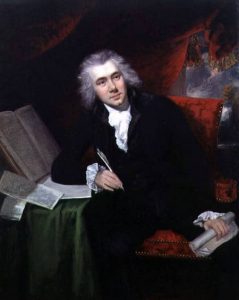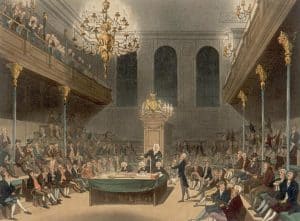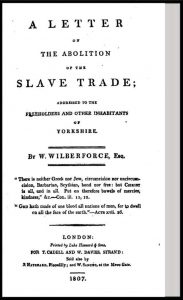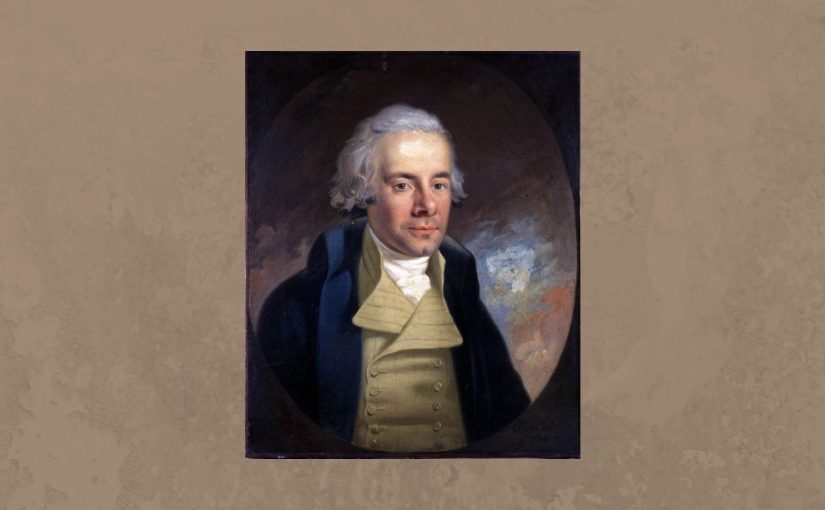This article, along with questions for discussion and reflection is available as a printable handout (PDF format) here.
Born to a wealthy family on August 24, 1759, William Wilberforce grew up generally unconcerned about those in need and those experiencing abuse and oppression in his native England. During this era, slavery was the order of the day, woven into the fabric of culture and business.

Young William had many friends and was well liked. He attended the University of Cambridge. During his time as a student there, he befriended several men who later would become quite influential in England. One of them even would be elected prime minister.1
William himself was elected to Parliament in 1780. He continued to enjoy a lifestyle that aligned with the wealth and popularity he’d known growing up; family connections and his likable personality afforded him a generous number of friends and social opportunities. Of these early years in his political career, Wilberforce later would say, “The first years in Parliament I did nothing — nothing to any purpose. My own distinction was my darling object.”
The first years in Parliament I did nothing — nothing to any purpose. My own distinction was my darling object.
—William Wilberforce—
Even so, before long, his money and active social life left him feeling empty. Yet he’d been attending church regularly, and a pastor shared with him that Jesus Christ died for his sins and offered him salvation as a free gift.2 In 1786, William gave his life to Christ and was transformed from the inside out.
William began to speak out as a committed believer in Christ. He encouraged his fellow countrymen to become Christians, as he had, even writing a book that carried this theme.3 He didn’t mean merely attending church and claiming to have a religious faith. Wilberforce advocated a profound and sincere Christianity, one that affects every area of life. Quite likely
the most obvious sign of Wilberforce’s conversion to the Christian faith was that it changed the way he looked at everything. Suddenly he saw what he was blind to before: that God was a God of justice and righteousness who would judge us for the way we treated others; that every single human being was made in God’s image and therefore worthy of profound respect and kindness; that God was “no respecter of persons” and looked upon the rich and the poor equally.4
Soon after becoming a believer, William considered leaving Parliament because he wanted to glorify God through his work; but several of his friends convinced him he actually best would be able to honor God as a member of Parliament. Wilberforce had become aware of and concerned about slavery, as well as the inhuman treatment of the slaves that typically went along with it. The institutional slavery practiced in England with its cruelties was a far cry for the indentured servitude authorized under Mosaic Law in Israel in the Old Testament. This 37-second video presents a powerful scene from the 2006 film Amazing Grace, which portrays many of the major events of Wilberforce’s life.
William Wilberforce resolved to use his position in Parliament to take aim at the slave trade. He began a long and arduous quest to limit and eventually end it. Form 1789 through 1805, these efforts included at least nine major attempts to pass legislation in Parliament that would limit or outlaw the slave trade. All of them failed. Along the way, Wilberforce sought to advance other reforms as well; so his efforts weren’t exclusively focused on slavery and the slave trade. Remember, William Wilberforce had come to understand that every area of life is under God’s authority and jurisdiction.
William Wilberforce had come to understand that every area of life is under God’s authority and jurisdiction.
Needless to say, lesser men would have given up — but Wilberforce never did. Of course, during these years, Wilberforce’s efforts to end the slave trade were not limited to legal and political actions alone, important as these were. They also included campaigns to educate his fellow countrymen about the trade. Through the written word in the form of pamphlets and the spoken word in speeches given at public meetings, Wilberforce and his allies convinced their fellow Britons to send a strong anti-slavery message throughout the economy by refusing to purchase sugar from growers who had relied heavily on slaves to produce their crops.5
The road was long and hard. Wilberforce faced strong opposition; yet increasingly he earned the friendships and respect of many. Over the years, support for his cause grew. At one point it appeared as though Wilberforce’s legislation easily would pass; but then twelve members of Parliament who supported it were overly confident about its passage and were not present to vote. The legislation was defeated by a mere four votes.6

Continuing his efforts, Wilberforce wrote A Letter on the Abolition of the Slave Trade. In his Letter, Wilberforce
 cites Acts, chapter 17, verse 26: “God hath made of one blood all nations. Wilberforce also appeals to basic moral teachings from the Hebrew Bible and the New Testament, such as loving the neighbor as oneself or doing unto others as we would have them do to us.
cites Acts, chapter 17, verse 26: “God hath made of one blood all nations. Wilberforce also appeals to basic moral teachings from the Hebrew Bible and the New Testament, such as loving the neighbor as oneself or doing unto others as we would have them do to us.
By this time, public opinion had shifted decisively in William Wilberforce’s favor. The legislation he proposed to end the slave trade in Great Britain — the Slave Trade Act of 1807 — passed resoundingly in the House of Lords. When soon thereafter it was considered in the House of Commons, many elected leaders took the opportunity they had to speak to affirm Wilberforce for working so tirelessly through the years for a cause they now realized was noble and worthy. As he listened, tears streamed down William Wilberforce’s face. His legislation passed in the House of Commons by a vote of 283 to 16.
While William Wilberforce’s legislation to end the slave trade represented a victory, it was one step in a process toward ending slavery in England altogether. That process would take several more years to complete, but William lived to see his nation reach that goal. Three days before he died on July 29, 1833, Parliament passed a law that ended slavery by giving slaves their freedom.
Reflecting on William Wilberforce’s work and his efforts to advocate for the dignity of all people as affirmed by biblical Christianity, we readily can understand that Wilberforce’s influence was not limited to the issue of slavery alone. Honoring God in Parliament — in the arena of politics and public policy — Wilberforce, through his efforts, uplifted much of British society as a whole. In her book Courageous Christians: Devotional Stories for Family Reading, Joyce Vollmer Brown concludes her biographical sketch of William Wilberforce this way:
People throughout Britain had turned back to God. When William Wilberforce started his heroic fight, there were only two other committed Christians in Parliament. By the end of his life, there were more than one hundred in each house. God had used his and his friends’ prayers and perseverance to change the heart of a nation.7
None of this, however, minimizes the significance of ending slavery in England through the political process. Remember that in the United States, a Civil War would have to be waged before slavery officially would end. Historian Alvin Schmidt writes,
It is difficult to find a better example than [William] Wilberforce to show the powerful effect the teachings and spirit of Christ have had in fighting the social sin of slavery. No proponent for the abolition of slavery ever accomplished more. Largely as a result of his indefatigable efforts, slavery came to a complete end in all of the British Empire’s possessions by 1840, making it the first modern country to abolish slavery.8
In light of evils occurring in our own day, the typical silence of the church in response to these evils, and against the backdrop of William Wilberforce’s amazing life and its remarkable, positive, and widespread influence, we are prompted to ask this penetrating question: At the point at which William Wilberforce began the quest that eventually would result in the end to the slave trade and slavery in Great Britain, what would England and the world have lost had he been convinced by a cacophony of voices belonging to pastors and other religious leaders that he must remain silent on the issue of slavery because it was “political”?
A list of additional questions follows:
Questions for Reflection and Discussion
-
-
- In your own words, what is the main lesson arising for Christians today from the life of William Wilberforce?
- How was all of England affected by Wilberforce’s lifelong efforts to end the slave trade, and eventually slavery itself?
- How was the gospel advanced by Wilberforce’s efforts, even though his work did not focus narrowly on preaching the gospel itself?
- Consider the idea that there is no arena over which God does not have jurisdiction. In practical terms, what kinds of things does this truth mean for a Christian in his or her everyday life?
- Why do some say that preachers and even all Christians should stay out of politics? What does the life of William Wilberforce tell us in response to this idea?
- In what kind of work are you regularly engaged? How can you glorify God in that work?
- What can you do to influence public policy for the glory of God?
-
Copyright © 2022 by B. Nathaniel Sullivan. All rights reserved.
Notes:
1Joyce Vollmer Brown, Courageous Christians: Devotional Stories for Family Reading, (Chicago: Moody Press, 2000), 137.
2Ibid.
3Ibid.
4Eric Metaxas, 7 Men and the Secret of their Greatness, (Nashville: Thomas Nelson, 2013), 45.
5Brown, 138.
6Ibid.
7Ibid.
8Alvin J. Schmidt, How Christianity Changed the World, (Grand Rapids: Zondervan, 2004), 278.
General information beyond that cited in these footnotes also came from the footnoted sources, as well as from these videos cited in the hyperlinks.
